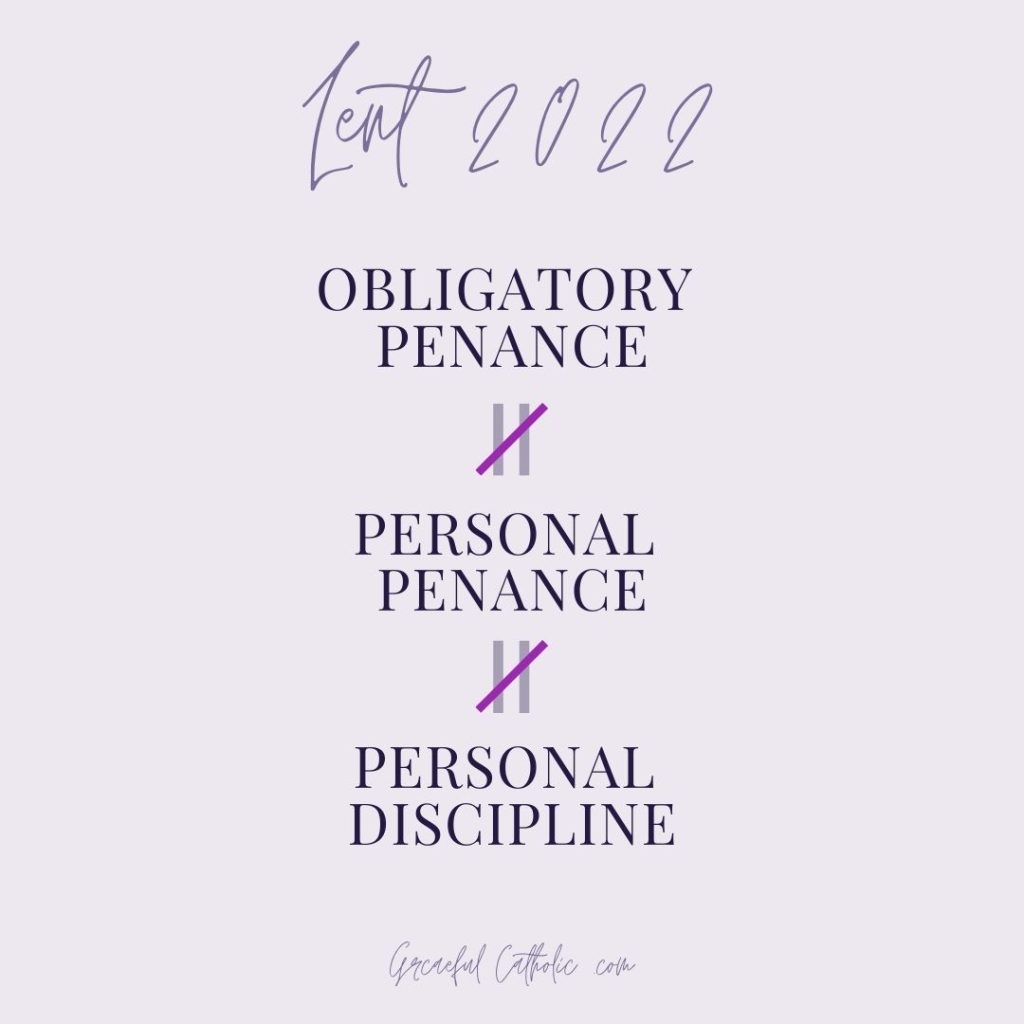Lent is the liturgical season consisting of 40 days of prayer, fasting, and almsgiving leading up to the solemnity of Easter.
“Unless you do penance, you shall likewise perish.” (Lk. 13:5)
We imitate our Lord, Jesus Christ’s fasting in the desert by doing penance: fasting (reducing how much food we eat) and abstinence (giving up good or comfortable things to turn our focus to God.)
Related: 43 Things Pregnant Ladies (or anybody) Can Give Up / Take On For Lent
“For those (we offend by our sins) are: God, our neighbour and ourselves. God we appease by prayer, our neighbour we satisfy by alms, and ourselves we chastise by fasting” (Catechism of Trent).
So, let’s get this straight:

Catholics are obligated to do specific penances like fasting and abstinence during Lent. This post explains which penances you have to do, how to choose an extra personal fast for Lent 2022 and whether or not you should also take on a Lenten discipline!
Obligatory Lenten penances for modern-day Catholics:
- Abstain from meat and fast on Ash Wednesday & Good Friday*
- Abstain from meat on Fridays
- Attend Mass on Sundays and Easter (a holy day of obligation)
So eating no meat on Fridays = required abstinence.
Eating only two small meals = required fasting.
But many Catholics also take up a personal habit of fasting (‘giving up’ something for Lent). Early Christians (like Pope Saint Gregory I) abided by strict abstinence and fasting: “We abstain from flesh meat, and from all things that come from flesh, as milk, cheese, and eggs.”
The question remains: should the faithful also adopt personal fasts and disciplines we are not obligated to? I absolutely think so!
*Note: Which Catholics Fast During Lent?
“For members of the Latin Catholic Church, the norms on fasting are obligatory from age 18 until age 59.
When fasting, a person is permitted to eat one full meal, as well as two smaller meals that together are not equal to a full meal. The norms concerning abstinence from meat are binding upon members of the Latin Catholic Church from age 14 onwards” (USCCB).
Can My Fast Be From Sinful Things?
“The stains of our own lives we wash away by fasting” (Catechism of Trent). Giving up sinful habits such as taking the Lord’s name in vain or gossiping is not technically a ‘fast’ since we are already not supposed to be sinning. The point of penitential fasting and abstinence is self-denial and reparation for our sins.
Giving up those sinful things can be a personal discipline. (One you can ideally make a habit of and continue after Lent!)
TLDR: The Difference Between Fasting and Discipline
A Lenten fast is giving up something good to focus your time / energy on Our Lord. Think Jesus in the wilderness preparing for His earthly ministry.
A Lenten discipline is something you challenge yourself to work on or a habit to adopt. Think breaking sinful habits like scrolling social media for hours on end or beginning to read The Bible every day.
When you choose a fast or discipline, the key is to keep it simple. In my experience, 1-2 of each is all I can remember (without getting super frustrated and giving up on all of them by the third day of Lent!)
Do you take on a discipline in addition to a personal fast?
This post may contain affiliate links, which means I receive a commission if you choose to make a purchase through one of my links (at no cost to you). See my disclosure for specifics.



To whom it may concern,
My name is Fr. Stephen Arabadjis. I am a member of the Society of St. Pius X. But I am in my 7th year of Sabbatical.Therefore I was hoping your group could do a 54 day rosary novena for my intentions. But any prayers and sacrifices would be greatly appreciated. I know Our Lady will reward you generously for this.
In Our Lady,
Fr. Arabadjis
P.S. Thanking you in advance, since I don’t always get all my communications.